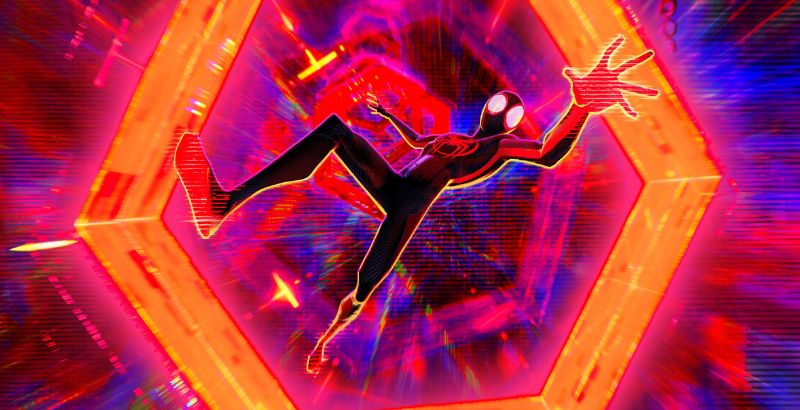
The long-awaited sequel to Spider-Man: Into the Spider-Verse is finally here from Sony Pictures and Animation Studios, and it’s breathtaking in a way I didn’t expect. Even with the foundation-shaking moments of the first film’s animation, I wasn’t prepared for how much Miles Morales‘s (Shameik Moore) return for the next chapter of the Spider-Verse Saga would leave me floored. Spider-Man: Across the Spider-Verse picks up after the events of the first with Miles feeling alone in a new way. Having become Brooklyn’s full-time friendly neighborhood Spider-Man, things aren’t going perfectly. While he has the love of the public even with some mistakes, is working with his dad (Brian Tyree Henry) to catch bad guys, and has a new suit he made, his life isn’t superheroically great.
Instead, he misses his friend Gwen Stacy (Hailee Steinfeld) and his mentor. He has a loving family, but the fear of revealing his identity to his mom (Luna Lauren Velez) and dad and losing that love is at the forefront of his mind with every choice he makes. Miles can’t talk to anyone about his struggles or get advice on how to rebound from his mistakes. That longing for his friends makes him long to be added to the Spider Society, and be among the other versions of Spider-Man that exist across the multiverse. But when he finally encounters the team of Spider-People charged with protecting the multiverse’s very existence, he has a choice to make. When the heroes clash on handling a new threat, Miles finds himself pitted against the other Spiders and must redefine what it means to be a hero and rewrite his story.
Watch Our Spider-Man: Across the Spider-Verse Review Here.
The film is directed by Joaquim Dos Santos, Kemp Powers, and Justin K. Thompson, and produced by Avi Arad, Amy Pascal, Phil Lord, and Christopher Miller. Peter Ramsey serves as Executive Producer with the creator of Marvel’s Miles Morales, Brian Bendis. With Spider-Man: Into the Spider-Verse, Sony Animation Studios sets a new standard for Western animation. In the sequel, Across the Spider-Verse, they’ve done it again. Building on the foundation of the first film, the team at Sony Animation delivers a mixed-medium masterpiece that uses 3-D CGI animation, stop motion animation, 2D animation, and so much more.
Embracing cell-shading and ben-day dots and even melding in live-action elements, Across the Spider-Verse is a visual symphony that never feels chaotic when multiple animation styles are on-screen at once. Character artists will receive worthy praise, and in that praise, the background and environment artists should also be recognized. Every detail of the background and environment art that builds the emotional atmosphere as much as the score or dialogue has to be admired as well. There is not one frame that doesn’t showcase the power of animation storytelling. Even when the film is cramming in Spider-Man after Spider-Man and endless references, it somehow never feels overstuffed.
Beautiful animation is a large piece of the film’s success, but the narrative that Phil Lord & Christopher Miller and Dave Callaham have crafted pushes this triumph of the medium to even greater heights. If the first film is about believing that you can wear the mask, Across the Spider-Verse is about choosing how you wear it. Miles has a choice to make. He can endure the pain that every other spider-person has before him. Jess (Issa Rae), Gwen, Hobie (Daniel Kaluuya), Pavitr (Karan Soni), Miguel (Oscar Isaac), Peter B. Parker (Jake Johnson), and the rest of the Spider Society may be a group of diverse people with experiences and places to match. Still, they are all bound together by tragedy. I mean, enduring trauma and loss is central to a hero, isn’t it? Here, Miles isn’t okay with enduring. He wants to write his own story.
There are two messages that are important for the audience. The first is understanding how to come to terms with not being able to save everyone and that sometimes, we fail. It’s a continuation of the first film in that way. Miles is pushed to grow up, and that’s to accept his moment of loss and the new ones that will come. As one of the film’s antagonists with The Spot (Jason Schwartzman), Miguel isn’t trying to stop Miles from ending the world. He’s trying to stop Miles in order to save it. It’s a nuance to the moral of the film that pushes the audience to investigate how we look at our own trauma.

Are we thankful for our trauma? Do we see the version of ourselves as only where we are in life because of our pain? Are the grief and tragedy worth it because it “makes us who we are?” Or are we the person sitting in that theater seat in spite of the moments of tragedy that sprinkle our lives? Should we endure in order to come out the other side stronger, or should we change the path walked by those before us and value our happiness and peace first?
I know it’s probably not a great writing style to ask so many questions in a review, but every one of those builds the core of the film. The Spot is getting so powerful that he may collapse the multiverse, but instead of that impending danger being the lone driving force of the narrative, the writers have chosen to make the conflict more personal. Miles has to work through the complexity of making the choice to rewrite his story. Not made lightly and told in parallel to Gwen’s struggle to be accepted by her father, Across The Spider-Verse takes big narrative swings packing in familial relationships and the pressures that come with them, how to handle grief, and investigating what makes the good guys, well, not the bad guys.
Spider-Man: Across the Spider-Verse is a perfect film, and it reaches that pinnacle by pushing so far out of the box that limits no longer exist. A thoughtful and powerful statement about the importance of animation as a medium for telling stories, Across the Spider-Verse understands the weight that Spider-Man carries as a character through movies and TV shows, comics and novels, and every iteration to come. This film makes the one before it better, and it ends with an impact that will fill the theater when the next film comes out.
Spider-Man: Across the Spider-Verse is in theaters June 2, 2023; get your tickets via our Fandango affiliate link.
Spider-Man: Across the Spider-Verse
-
Rating - 10/1010/10
TL;DR
A thoughtful and powerful statement about the importance of animation as a medium for telling stories, Across the Spider-Verse understands the weight that Spider-Man carries as a character through movies and TV shows, comics and novels, and every iteration to come.




